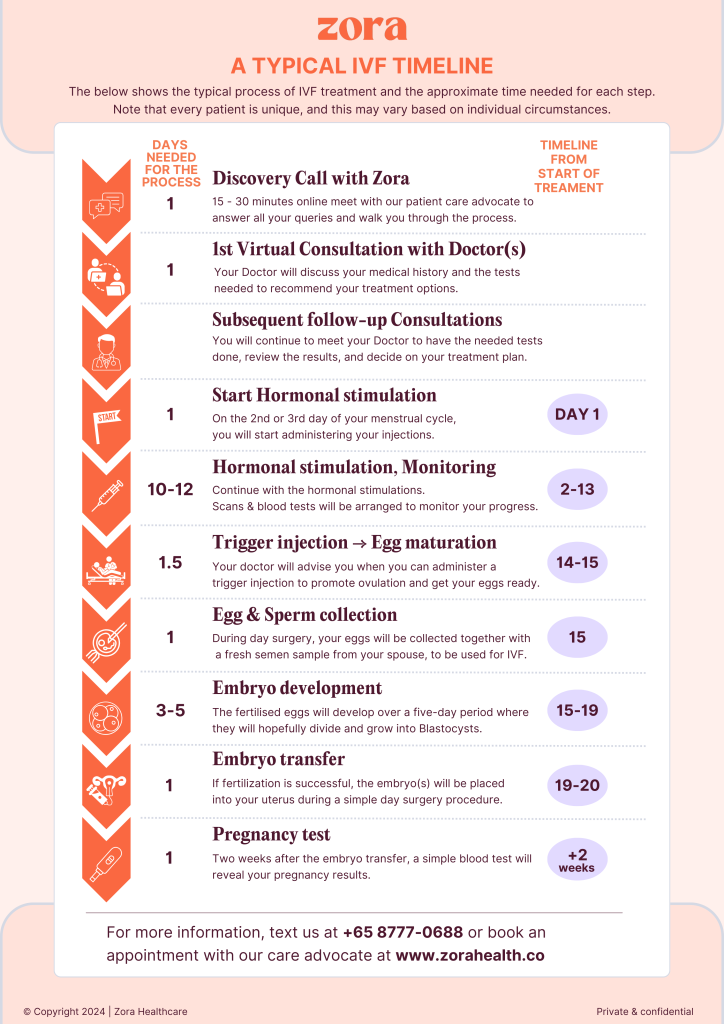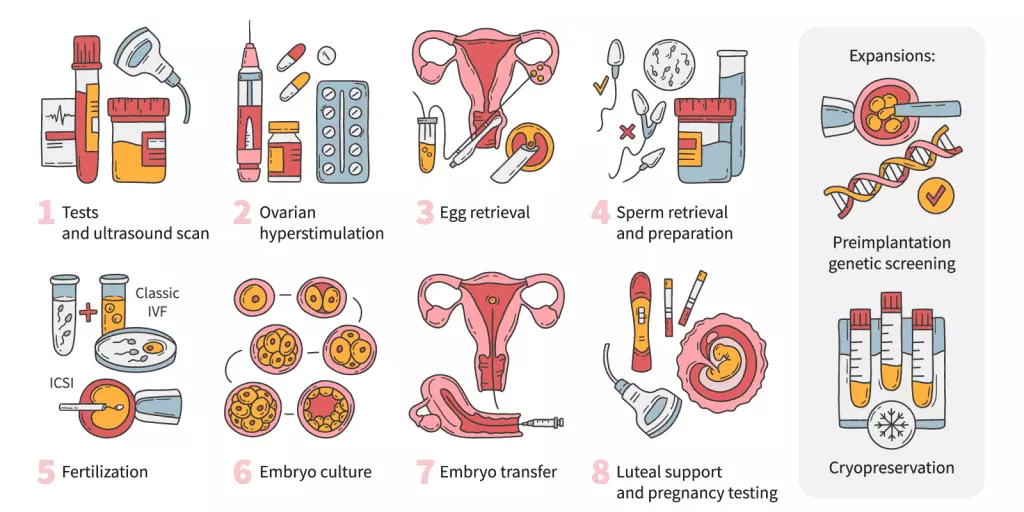In Vitro Fertilisation (IVF)
In vitro fertilization (IVF) is a fertility treatment that’s potentially beneficial for people who struggle with getting pregnant.
During IVF, mature eggs are retrieved from your ovaries and fertilized with sperm in a laboratory to form embryos. One or more embryos is then transferred back into your uterus to be implanted and develop into a healthy fetus.
IVF can be complex, and many individuals have also shared that it’s emotionally and physically taxing. However, this treatment has helped many folks become parents ever since it was invented in 1977.
If you’re having trouble conceiving, you can start with more “basic” treatments, such as hormone therapy and intrauterine insemination (IUI). You can then opt for the IVF process if none of those treatments work.
However, you might want to consider IVF sooner rather than later, as clinics generally recommend around three cycles of “basic” treatments before moving onto an advanced one like IVF.
By transitioning to the IVF procedure, couples can significantly increase their chances of success for a shorter time to pregnancy. Additionally, IVF can improve the chances of success even if:
- You’re older,
- You suffer from unexplained infertility, or
- You have a medical condition affecting your ovaries
At Zora Health, we match patients with licensed IVF providers who are committed to giving you personalized care and support throughout the process.
IVF might be suitable for you if you have the following condition:
- Endometriosis: This happens when endometrial tissue, which lines the inside of the uterus, grows outside of it. The tissue can attach to other organs in the area too, such as the ovaries and fallopian tubes. This potentially leads to inflammation and scarring, which increases the chance of infertility. IVF can be an effective treatment option for women with endometriosis. Remember, IVF bypasses the fallopian tubes and directly fertilizes mature eggs in a lab, allowing for a successful pregnancy despite the condition.
- Uterine fibroids: Fibroids are benign tumors in the uterus. Don’t worry, they almost never cause cancer and are not linked with an increased risk of cancer either. They are common across women in their reproductive years. Uterine fibroids can interfere with the implantation of the fertilized egg, but complete infertility is rare.
- Tubal disease or tubal ligation: If you’ve previously undergone tubal ligation or have a medical issue with your fallopian tubes, IVF is ideal. This procedure bypasses the tubes and implants the embryo directly in your uterus to increase your chances of pregnancy.
- Severe male factor infertility: Low sperm concentration, low sperm mobility, or abnormalities in sperm size and shape can make it difficult for the egg to be fertilized. IVF is recommended if your partner’s semen analysis shows that they have insufficient healthy sperm to be successful with natural conception or more “basic” fertility treatments like IUI. In such cases, you can undergo an advanced method of fertilization called intracytoplasmic sperm injection (ICSI). This involves injecting a single healthy sperm directly into an egg to enhance the likelihood of fertilization.
- Recurrent miscarriages: This is defined as two or more consecutive clinical pregnancy losses before 20 weeks of gestation. It’s also known as recurrent pregnancy loss. Even if you have this condition, rest assured that it does not lower your chances of a successful pregnancy the next time you try to conceive.
- Cancer or other health conditions: If you’re about to start cancer treatment, such as radiation or chemotherapy, it could harm your fertility. As such, the egg freezing or embryo freezing aspect of the IVF process can be a way to preserve your fertility. You can have your mature eggs harvested from your ovaries and frozen for the future. Alternatively, the eggs can be fertilized first before being frozen as embryos.
Zora Health's IVF Package
- 30-minute initial consultation with Zora Health’s Care Advocate
- Fertility consultation with a specialist
- Hormone medications & injections for follicular stimulation
- 3x consultations (with bloodwork & ultrasound)
- Egg retrieval procedure (sedation included)
- Sperm collection and preparation
- Operating theatre and day ward charges
- Procedure planning, specialist procedure fees & anaesthetist fee
- Extra embryo storage for 1 year (Free!)
Why Work With Zora Health?
Ongoing expert support throughout your entire treatment journey
Dedicated Care Navigators to help you compare global clinic options and key considerations
Curated list of key questions to ask your specialist
End-to-end support—from your first questions to post-treatment care
Zora Health Marketplace
We work with holistic wellness partners in our marketplace:
- TCM packages
- Exercise packages
- Massage packages
- Pre-natal yoga
- Meal subscription plan
Price is variable*
* Pricing varies by location, logistics and final treatment plan determined by your fertility specialist.
You may let us know if you have a preferred doctor.
Why work with Zora Health?
- Expert support throughout your journey
- Care navigator to advise you on global clinic options
- List of questions to ask your specialist
Transparent pricing
No hidden fees or surprise costs
We work with holistic wellness partners in our marketplace:
- TCM packages
- Exercise packages
- Massage packages
- Pre-natal yoga
- Meal subscription plan
Zora Health does not provide medical advice or administer treatments. We connect clients with appropriate clinics partners globally for relevant care.
The Full IVF Step-by-Step Process

Fertility Testing and Diagnosis
In the IVF step-by-step process, you and your partner will firstly need to go for ovarian reserve testing and semen analysis. The ovarian reserve is an indicator of how many eggs you have available in your body right now. Meanwhile, a semen analysis looks at your partner’s sperm concentration, mobility (how efficiently the swimmers move), and their appearance.
At Zora Health, we connect you with IVF clinics committed to exploring all available treatment options and recommending the best plan possible for your unique fertility needs.
1
Care Coordination and Financial Consultation
Your doctor and clinical team will review your medical history and determine the best IVF treatment plan for you.
You will then be advised on the schedule, what medication you’ll need to take, and how to prepare for the IVF procedure.
2
(Optional) Pre-IVF Hormonal Preparation
Your care team may recommend you to take birth control pills first. These pills can help synchronize follicle growth during ovarian stimulation in the next step. It also grants you flexibility in scheduling the date for egg retrieval.
With birth control pills, you can choose a specific week to retrieve your eggs and work backwards to pick a start date for ovarian stimulation. This leads to a smoother and more manageable IVF cycle, especially if you have a hectic schedule.
Along with birth control pills, your care team may perform additional tests and recommend lifestyle adjustments you might need to make.
3
Stimulating Egg Production
Next, you’ll begin daily injections of these hormones:
Follicle-stimulating hormone (FSH)Luteinizing hormone (LH)
These injections are higher doses of natural hormones that replicate what your body produces to mature one egg. The goal is to stimulate the growth and development of multiple eggs, allowing you to fertilize more than what your body would naturally produce.
Several eggs are needed to boost the IVF success rate. That’s because some eggs would not become fertilized, while others might not develop well after fusing with the sperm.
Before you begin hormonal treatments, your care team will provide detailed instructions for administering the medication. Please follow these instructions carefully to ensure the medicine is administered correctly and punctually.
During this time, you’ll be visiting your specialist regularly too. These in-person appointments include blood tests and ultrasounds to ensure your follicles are growing properly. The specialist may adjust your medication dosage as well, if necessary.
While the medications are natural hormones, your ovaries may start to enlarge in response to them. This might lead to abdominal discomfort or bloating. Also, the increased estrogen levels may cause heightened PMS symptoms.
4
Ovulation, Trigger Injection, and Egg Retrieval
At the end of the stimulation period, your eggs are ideally mature and ready for retrieval. You'll receive a hormone injection to induce ovulation. This injection helps the eggs to mature while preparing your body for egg retrieval.
After 24-48 hours of receiving the final injection, you will return to the clinic to retrieve your eggs. An anesthesiologist will sedate you to ensure that you are comfortable. Then, the fertility specialists will gently and carefully remove your eggs. This process usually lasts around 15-60 minutes.
After your eggs are retrieved, you can rest comfortably in the recovery room until you’re ready to head home. As you would be under anesthesia for the process, we recommend someone to bring you home after the procedure is completed.
This is the only day out of the entire IVF process that you’re recommended to take the day off.
5
Sperm Collection and Processing
While your eggs are being retrieved, your partner’s sperm will be collected too. After ejaculation, laboratory specialists will carefully analyze and process the ejaculated semen sample to isolate healthy sperm that move well.
This involves removing unwanted plasma, mucus, debris, and dead sperm from the semen to yield the best sperm for fertilization.
The specialists will take every step necessary to ensure the sperm used in the IVF process is of the highest quality. This allows you to maximize the chances of a successful fertilization.
6
Egg Fertilization
Before fertilization, only mature eggs are selected for injection with a single sperm via ICSI. As this step of the IVF procedure takes some time to complete, you’ll be notified by the clinic when the results are ready.
After the eggs are fertilized, the lab specialists will closely monitor the embryos as they develop. You’ll also be updated on how the embryos are growing. Embryos are typically evaluated on the third and fifth day after fertilization to assess their quality and ensure only the healthiest ones are transferred to your uterus.
7
Embryo Transfer
At this stage, your doctor will assess how suitable you are for an embryo to be placed in your uterus. The transfer is usually done two to six days after your eggs were first collected.
A catheter (long and thin tube) with a syringe attached to the end is inserted into your vagina where it can reach the uterus to transfer around 1-2 embryos. The exact number depends on your doctor’s recommendations, along with your decision.
Rest assured that this process is quick and completely painless. You can take a mild sedative to help you relax as well. If everything goes smoothly, the embryo(s) will attach to the uterine lining within a few days.
The remaining embryos will be frozen and stored for future transfers should you be trying for a child again or if this IVF cycle does not succeed.
8
Pregnancy Testing and Monitoring
Following the embryo transfer, you’ll be provided with medication that supports the early stages of pregnancy. These include estrogen supplements and progesterone. After about two weeks, you will take a pregnancy test.
Assuming a positive outcome, congratulations! You’re well on your way towards building a family. If your pregnancy test result is negative, a follow-up visit will be scheduled to discuss the next steps.
9
Embryo Vitrification
As mentioned above, you can choose to freeze any remaining high-quality embryos for future use. This is done through vitrification, where water is removed from the embryos and replaced with an "antifreeze" solution.
Then, the embryos are rapidly cooled. It’s a special technique that prevents cells from being damaged during the freezing process by avoiding the formation of ice crystals.
Transferring frozen embryos to your uterus works the same way as fresh ones, just that the former needs to be thawed first.
10

As seen in







You deserve the very best.
That's why we’re here to support you — from the first consultation all the way to egg storage and pregnancy.
1
Enjoy an Introductory Call With a Zora Health Care Advocate
An introductory call so you can understand the IVF process, the associated costs, and relevant rules and regulations.
We’re here to answer your questions, ensuring you confidently move forward.
Do note that we do not answer medical questions.
2
Benefit From the Flexibility to Choose Your Doctor
We truly understand how important it is to find a doctor you are comfortable with for IVF.
Whether you already have someone in mind or prefer our team to recommend an appropriate specialist and IVF clinic, we’re here to help.
We will also provide you with a list of questions to ask during your consultation, ensuring that you would be fully prepared for it to maximize your time.
3
Attend Fertility Tests & Reviews
Once you’ve chosen your clinic, your specialist will review your goals and medical history, conduct the necessary tests, and schedule a follow-up to discuss your proposed IVF plan.
4
Begin Your IVF Journey Worry-Free
Our team will support you at every stage of your fertility journey, no matter which IVF clinic you choose worldwide.
FAQs About IVF
What lifestyle factors can affect my fertility or my IVF success rate?
Your lifestyle and environment can impact your fertility, and in turn, your chances of having a successful IVF pregnancy.
Research consistently shows that numerous lifestyle factors can affect fertility in women, men, or both. These include but are not limited to:
Nutrition, weight, sleep quality, and exercisePhysical and psychological stressEnvironmental and occupational exposuresCigarette smokingSubstance and drug useAlcohol and caffeine consumptionCertain medications (chemotherapy drugs, hormonal steroids, etc.)
Research has also found that:
Obesity is linked to lower sperm count and quality. Obese individuals with polycystic ovary syndrome (PCOS) can greatly improve their chances of ovulation and pregnancy by losing just 5% of their body weight. Being underweight isn’t healthy either as it’s linked to infertility and poor ovarian function.Strenuous physical labor and taking multiple medications may lower sperm count. Body-building medication or androgens can affect sperm formation. High blood pressure is associated with negative sperm quality.
Lifestyle factors are habits you can change for the better. For example, set aside time to exercise regularly and keep your weight within a healthy range. Not only would this help enhance your IVF success rate, but it also ensures a healthier you.
That said, we completely understand the need to take medication for your general well-being, even if that might impact your fertility levels.
How long does the IVF process take?
IVF is a step-by-step process that generally lasts 6-8 weeks, from the initial consultation with a specialist to the embryo transfer.
Here’s how long each step usually takes:
Fertility testing and diagnosis: 1 dayCare coordination and financial consultation: 1day(Optional) Pre-IVF hormonal preparation: 1-7 days, depending on the birth control pill taken Stimulating egg production: 1-2 weeksOvulation, trigger injection, and egg retrieval: 2-3 daysSperm processing and collection: 0 days (same time frame as egg retrieval)Egg fertilization: 3-5 daysEmbryo transfer: 1 dayPregnancy testing and monitoring: ~2 weeksEmbryo vitrification: 1 dayDo I need to take time off work for the IVF procedure?
Don’t worry! All IVF and egg freezing appointments are outpatient procedures. This means you won't need to stay overnight at the clinic.
However, we recommend you to take 1-2 days off for the egg retrieval process. For all other procedures in an IVF cycle, you have the freedom to choose whether you need time off work or other life obligations.
At Zora Health, we offer flexible appointment scheduling for the entire IVF step-by-step process to accommodate your schedule.
What are some of the side effects that I may experience from the IVF process?
During Ovarian Stimulation
Skin Changes
You may experience skin changes due to the hormonal shifts caused by fertility medication. Acne breakouts are the most common skin changes while some people may experience dryness and flakiness instead.
Although you can’t predict how your skin will react during the IVF treatment cycle, there are a few simple steps you can take to prevent or manage such changes.
For example, use a gentle and oil-free facial cleanser and moisturizer that suits your skin type before starting any IVF treatment or egg freezing cycle.
Bloating and Constipation
Bloating is a common side effect of ovarian stimulation, which can affect your appetite due to the limited abdominal space occupied by the ovaries and bloating.
Constipation is also typical during an IVF procedure. It’s often associated with elevated progesterone levels. This occurs after ovulation, egg retrieval, and during the actual pregnancy too.
Weight Gain
Weight gain during ovarian stimulation is normal due to stress, hormone fluctuations, and bloating. Although it’s a common side effect, weight gain may still lead to elevated stress.
During this time, proactively find ways to manage it, and speak with the IVF clinic staff to see what advice they have and discover how other patients deal with stress.
Headaches
Headaches can also occur during ovarian stimulation, especially if you already frequently experience headaches or migraines. Hormonal changes in the body typically trigger these headaches.
After Egg Retrieval
Soreness
After the egg freezing cycle ends, your menstrual cycle should return to normal. Also, any soreness from the egg retrieval should subside within a few days. You may feel a little pain when you wake up, which is similar to period pains. However, such side effects typically last only a few days after the procedure.
Most women can resume their daily activities, including work, the day after the procedure. However, it’s no harm if you take a few days off to rest.
Ovarian Hyperstimulation Syndrome (OHSS)
In rare cases, Ovarian Hyperstimulation Syndrome (OHSS) may occur if the fertility medication excessively stimulates the ovaries. This condition results in swollen and enlarged ovaries and fluid accumulation in your abdominal cavity.
While the chances of OHSS or other severe side effects are very low, rest assured that you’ll still be monitored closely for signs of such complications throughout the egg freezing process.
If any severe side effects are detected, your doctor will act swiftly to stop them from progressing further.
After the Embryo Transfer
Ectopic Pregnancy
This happens when the embryo is implanted in a fallopian tube rather than the uterus. Unfortunately, you will not be able to re-implant the growing embryo in the uterus. It has to be removed entirely from the fallopian tube via medicine or a surgery.
Please ensure you attend the scan 5-6 weeks after the embryo transfer to ensure your pregnancy is normal, and that the embryo is developing well.
Multiple Births
If more than one embryo transferred and successfully implanted in your uterus, it increases the chance of twins or even triplets developing. This is definitely a blessing, but it also increases the risk of complications arising. These include miscarriage and a premature birth.
My friends recommended me a doctor, but they’re not in your network. Can I still use your services?
Of course! You have the flexibility to choose your own doctor. You may opt for your preferred doctor or anyone from our partner clinics and hospitals around the world.
Simply let us know your preferred doctor, and we will contact them for a quick discussion.
What is ICSI (intracytoplasmic sperm injection)?
ICSI stands for intracytoplasmic sperm injection. This involves the direct injection of a single sperm into the center of an egg, which boosts the likelihood of fertilization. Traditionally, IVF procedures would place thousands of sperm next to an egg in a petri dish and leave fertilization up to chance.
